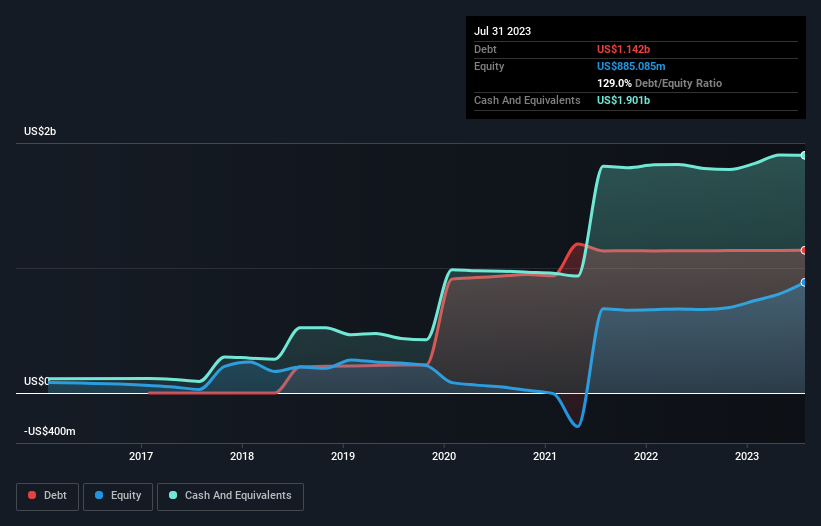David Iben put it well when he said, 'Volatility is not a risk we care about. What we care about is avoiding the permanent loss of capital.' It's only natural to consider a company's balance sheet when you examine how risky it is, since debt is often involved when a business collapses. As with many other companies MongoDB, Inc. (NASDAQ:MDB) makes use of debt. But should shareholders be worried about its use of debt?
Why Does Debt Bring Risk?
Debt assists a business until the business has trouble paying it off, either with new capital or with free cash flow. Ultimately, if the company can't fulfill its legal obligations to repay debt, shareholders could walk away with nothing. However, a more usual (but still expensive) situation is where a company must dilute shareholders at a cheap share price simply to get debt under control. Of course, plenty of companies use debt to fund growth, without any negative consequences. When we examine debt levels, we first consider both cash and debt levels, together.
View our latest analysis for MongoDB
What Is MongoDB's Debt?
The chart below, which you can click on for greater detail, shows that MongoDB had US$1.14b in debt in July 2023; about the same as the year before. But it also has US$1.90b in cash to offset that, meaning it has US$759.5m net cash.

A Look At MongoDB's Liabilities
According to the last reported balance sheet, MongoDB had liabilities of US$512.3m due within 12 months, and liabilities of US$1.25b due beyond 12 months. Offsetting these obligations, it had cash of US$1.90b as well as receivables valued at US$272.4m due within 12 months. So it actually has US$410.3m more liquid assets than total liabilities.
This state of affairs indicates that MongoDB's balance sheet looks quite solid, as its total liabilities are just about equal to its liquid assets. So it's very unlikely that the US$29.1b company is short on cash, but still worth keeping an eye on the balance sheet. Simply put, the fact that MongoDB has more cash than debt is arguably a good indication that it can manage its debt safely. There's no doubt that we learn most about debt from the balance sheet. But it is future earnings, more than anything, that will determine MongoDB's ability to maintain a healthy balance sheet going forward. So if you're focused on the future you can check out this free report showing analyst profit forecasts.
Over 12 months, MongoDB reported revenue of US$1.5b, which is a gain of 37%, although it did not report any earnings before interest and tax. With any luck the company will be able to grow its way to profitability.
So How Risky Is MongoDB?
While MongoDB lost money on an earnings before interest and tax (EBIT) level, it actually generated positive free cash flow US$45m. So although it is loss-making, it doesn't seem to have too much near-term balance sheet risk, keeping in mind the net cash. We think its revenue growth of 37% is a good sign. There's no doubt fast top line growth can cure all manner of ills, for a stock. When analysing debt levels, the balance sheet is the obvious place to start. However, not all investment risk resides within the balance sheet - far from it. To that end, you should be aware of the 3 warning signs we've spotted with MongoDB .
If, after all that, you're more interested in a fast growing company with a rock-solid balance sheet, then check out our list of net cash growth stocks without delay.
New: Manage All Your Stock Portfolios in One Place
We've created the ultimate portfolio companion for stock investors, and it's free.
• Connect an unlimited number of Portfolios and see your total in one currency
• Be alerted to new Warning Signs or Risks via email or mobile
• Track the Fair Value of your stocks
Have feedback on this article? Concerned about the content? Get in touch with us directly. Alternatively, email editorial-team (at) simplywallst.com.
This article by Simply Wall St is general in nature. We provide commentary based on historical data and analyst forecasts only using an unbiased methodology and our articles are not intended to be financial advice. It does not constitute a recommendation to buy or sell any stock, and does not take account of your objectives, or your financial situation. We aim to bring you long-term focused analysis driven by fundamental data. Note that our analysis may not factor in the latest price-sensitive company announcements or qualitative material. Simply Wall St has no position in any stocks mentioned.
About NasdaqGM:MDB
Flawless balance sheet with reasonable growth potential.
Similar Companies
Market Insights
Weekly Picks


The "Sleeping Giant" Stumbles, Then Wakes Up

Swiped Left by Wall Street: The BMBL Rebound Trade


Duolingo (DUOL): Why A 20% Drop Might Be The Entry Point We've Been Waiting For
Recently Updated Narratives

The Real Power Behind Alphabet’s Growth

RELX: The Quiet Compounder Powering Law, Science, and Risk Intelligence

Why CVS’s Valuation Signals Opportunity
Popular Narratives


A case for CA$31.80 (undiluted), aka 8,616% upside from CA$0.37 (an 86 bagger!).


NVDA: Expanding AI Demand Will Drive Major Data Center Investments Through 2026





